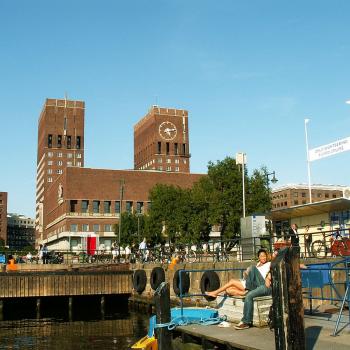He’s not alone in being this way; he didn’t come from nowhere, popping out ex nihilo like matter on the first day of creation. As some have already argued, he’s an accelerationist. This term is a complicated one—and it applies on both the Right and the Left, though it’s typically used of the former. Most importantly it refers to the belief that one should use whatever means possible to push the ailing Liberal world into collapse so that something new might emerge. As long as certain Liberal structures like the U.N. and IMF exist (along with the stable national entities that preserve them), the world cannot truly change. Our world is a global one, based on certain principles. This order defends itself at all costs. It will destroy anything that opposes it, hence Al Qaeda, ISIS, North Korea, Venezuela, even (at a certain point) Greece and how these groups and places were treated by international organizations. The message is clear: “play by the rules or else.” Accelerationism argues that only the escalation of conflict can destroy these self-sustaining institutions and allow for the birth of a new world.
Nick Land is a major and important thinker in this tradition, whose work, unsurprisingly, has found its primary audience through the internet (Land himself has quite a bit to say about digitalization; in fact, he used to be a part of a collective called the “Cybernetic Culture Research Unit”). He is well-educated. Many on the Left seem to think of those on the Right as either self-deluded Trump voters or pimply teenagers deprived of sex and thus lusting for power, equipped at best with semi-coherent Reddit posts and anime love pillows, yearning for acceptance and bullying through the barrel of a gun when denied it. I am here to say they are wrong; Land shows that they are wrong. He is well-read and articulate; his thought presents a serious challenge to Left academia on its own terms. As McKenzie Wark has written at Verso (a major Left book publisher):
Some writers are curators of a culture they received from the past; others are the antennae of a culture around them. Nick Land is the latter. One reads him for the symptoms of the age. I’m interested in some earlier work, which still has a cult following. And how could it not, with a project such as this? Land: “Whenever its name has been anything but a jest, philosophy has been haunted by a subterranean question: What if knowledge were a means to deepen unknowing? It is this question alone that has differentiated it from the shallow things of the earth. Yet the glory and also the indignity of philosophy is to have sought the end of knowing, and no more.” (206)
Land achieved notoriety in recent years as a prophet of Neo-reaction. I’m not going to say much about those texts, although they do pose questions for reading the early work. I’m not inclined to read Land, or anyone, through a teleology in which the later positions were always present in embryo. I think writers careen through a garden of forked paths, where each decision opens up onto others, and others in turn. A position is just one possibility out of many for where a line of thought might stagger. (“On Nick Land”)
Or, as Mark Fisher has put it:
Land was our Nietzsche—with the same baiting of the so-called progressive tendencies, the same bizarre mixture of the reactionary and the futuristic, and a writing style that updates nineteenth-century aphorisms into what Kodwo Eshun called “text at sample velocity.” (“Terminator vs. Avatar: Notes on Accelerationism”)
What is Land? For starters, he’s a critic of capitalism. The world he envisions after it, however, is not much like the Marxist one. Here there is no utopic equality and optimal work-leisure balance. Rather, according to him, the new world can come only through the inhabiting and explosion of the old until we re-organize along lines that look more like well-read Steve Bannon than Bernie Sanders or Mumia Abu-Jamal:
Capital, in its ultimate self-definition, is nothing beside the abstract accelerative social factor. Its positive cybernetic schema exhausts it. Runaway consumes its identity. Every other determination is shucked-off as an accident, at some stage of its intensification process. Since anything able to consistently feed socio-historical acceleration will necessarily, or by essence, be capital, the prospect of any unambiguously ‘Left-accelerationism’ gaining serious momentum can be confidently dismissed. Accelerationism is simply the self-awareness of capitalism, which has scarcely begun. (“We haven’t seen anything yet.”)
At the time of writing, Left-accelerationism appears to have deconstructed itself back into traditional socialist politics, and the accelerationist torch has passed to a new generation of brilliant young thinkers advancing an ‘Unconditional Accelerationism’ (neither R/Acc., or L/Acc., but U/Acc.). Their online identities – if not in any easily extricable way their ideas – can be searched-out through the peculiar social-media hash-tag #Rhetttwitter.
As blockchains, drone logistics, nanotechnology, quantum computing, computational genomics, and virtual reality flood in, drenched in ever-higher densities of artificial intelligence, accelerationism won’t be going anywhere, unless ever deeper into itself. To be rushed by the phenomenon, to the point of terminal institutional paralysis, is the phenomenon. Naturally – which is to say completely inevitably – the human species will define this ultimate terrestrial event as a problem. To see it is already to say: We have to do something. To which accelerationism can only respond: You’re finally saying that now? Perhaps we ought to get started? In its colder variants, which are those that win out, it tends to laugh. (“A Quick-and-Dirty Introduction to Accelerationism”)













